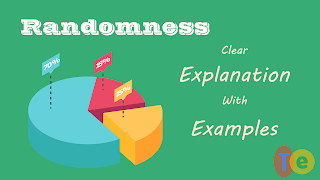What is Randomness
Randomness is one of the most important pillars to support the statistic and probability temple.
Randomness is unpredictable. In the common parlance, randomness is the apparent lack of pattern or predictability in events. Please remember: Randomness is unpredictable but it not equal to uncertainty. Let’s say team A has a 60 percent chance to win the game, that percentage is a certain number although you can’t tell whether they will win or lose next time.
We can consider randomness is that we know all the possibilities, the only thing we don’t know is which one will happen next. Flipping a coin, you don’t know whether it will show head or tail, but it must be one of them. Shuffle play music, although you can’t predict which song will play next, it must be one on your playlist.
On the other hand, uncertainty is we have no idea what can happen next. For example the Black swan theory - something that comes as a total surprise. Bay the way all swans in New Zealand are black, here’s a picture I took last week. So cute.
When studying a certain field you can apply two strategies: bottom-up and top-down.
For the bottom-up strategy, we will build up the concepts from foundational to more advanced. This approach is often more preferred when we learn things in school. The advantage is that we can at all times rely on previously learned concepts. However, most times we soon find lots of concepts that are not particularly interesting or anti intuitional. So as you know the lack of motivation means that most of them are quickly forgotten.
Top-down is digging down from a practical goal to more basic requirements. This goal-driven learning strategy let us know at all time that why we need to work on a particular concept, and there is a clear path of required knowledge. The shortage of this strategy is that the knowledge is built on potentially shaky foundations, the path to our destination becomes foggy and we can easily be lost.
In my video, the question asked tied together with the topic so you won’t have to worry about bottom-up or top-down. But I believe you may with a real-world question when watching this video. In that case, I hope this video can help you get the concept in an efficient manner. So you cad decide whether to go deep or search somewhere else.
Back to this video’s hero Randomness. Technically speaking it’s impossible to generate a random number on a computer. It has to be based on some sort of seed. The problem is that the seed isn’t truly random. Therefore there is nothing random about a computer. Randomness can only be simulated by computer. At this time (2020) you can consider Quantum fluctuation is the only true randomness. Beautiful ha?
Be aware here we human being not good at recognizing randomness and we are terrible to generate random things too. When iPod first introduce shuffle which will randomly play the music you have, they got a lot of complaints like “I don’t feel my music randomly played. You know I have tons of music in my iPod, there’s a dozen I can hear day in day out and others I won’t hear for weeks.” or “one song played 3 times in a row, how you can call that random?!” At the time, Apple introduced a “Smart Shuffle” feature which essentially let you drag a slider of how random your shuffles would be. I remember Steve Jobs joked about this when introducing the iPod Shuffle.
It worth mentioning here, some scientists believe there is no randomness at all. You can find the causation chain of every event. Like when you flipping a coin your hand movement contributes a large portion of whether it will land tail or head. Your hand moves that way because the signal generated from the brain and your brain generate that signal because the surroundings and even the food you just eat… this chain goes on and on. But I suppose you get the idea, there’s no random at all, why we see the randomness is we can’t gather all the information to analyze the caution chain. But I want to argue here that Quantum fluctuation is true randomness at less for now. So who is right? We will see.
How to take advantage of randomness? let‘s see an example: Some genetically modified crops have insect-resistant genes, however, insects will immune to it really soon. since the majority died after eating the genetically modified crops only those who because of gene mutation have the anti-insect-resistant genes survival. How to deal with it? Simple, we just put some non genetically modified crops in this field. By doing that we remove the filter of insects’ gene mutation. Let the randomness back to gene mutation. So the crops can resiste insects for a much longer time.
Check the video of this blog click here.

Comments
Post a Comment